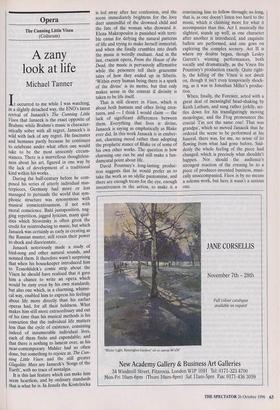Opera
The Cunning Little Vixen (Coliseum)
A zany look at life
Michael Tanner
It occurred to me while I was watching, in a slightly detached way, the ENO's latest revival of Janacek's The Cunning Little Vixen that Janacek is the exact opposite of Brahms: while Brahms's music is character-
istically sober with all regret, Janacek's is wild with lack of any regret. He fascinates and bemuses partly because he continues to celebrate under what often one would take to be the most unseemly circum- stances. There is a marvellous thoughtless- ness about his art, figured in one way by the lack of development of a traditional kind within his works.
During the half-century before he com- posed his series of utterly individual mas- terpieces, Germany had more or less managed to persuade the world that sym- phonic structure was synonymous with musical conscientiousness, if not with moral conscience. Bald juxtaposition, nag- ging repetition, jagged lyricism, many qual- ities which Stravinsky is often given the credit for reintroducing to music, but which Janacek was certainly as early in creating as the Russian master, still retain their power to shock and disorientate.
Janacek notoriously made a study of bird-song and other natural sounds, and notated them. It therefore wasn't surprising that when his housekeeper introduced him to Tesnohlidek's comic strip about the Vixen he should have realised that it gave him a chance to write an opera which would be zany even by his own standards, but also one which, in a charming, whimsi- cal way, enabled him to express his feelings about life more directly than his earlier operas had, for all their boldness. What makes him still more extraordinary and out of his time than his musical methods is his conviction that the individual life matters less than the cycle of existence, consisting indeed of innumerable individual lives, each of them finite and expendable; and that there is nothing to lament over, as his near-contemporary Mahler had so often done, but something to rejoice at. The Cun- ning Little Vixen and the still greater Glagolitic Mass are Janacek's 'Songs of the Earth', with no trace of nostalgia.
It is this last feature which can make him seem heartless, and by ordinary standards that is what he is. In Jenufa the Kostelnicka
is led away after her confession, and the scene immediately brightens for the love duet unmindful of the drowned child and the fate of the woman who drowned it. Elena Makropoulos is punished with terri- ble ennui for defying the natural patterns of life and trying to make herself immortal, and when she finally crumbles into death the music is weirdly exultant. And in the last, craziest opera, From the House of the Dead, the music is pervasively affirmative while the prisoners tell their gruesome tales of how they ended up in Siberia. `Within every human being there is a spark of the divine' is its motto, but that only makes sense in the context if divinity is taken to be life itself.
That is still clearer in Vixen, which is about both humans and other living crea- tures, and — I think I would claim — the lack of significant differences between them. Everything that lives is divine, Janacek is saying as emphatically as Blake ever did. In this work Janacek is in exuber- ant, charming mood rather than adopting the prophetic stance of Blake or of some of his own other works. The question is how charming one can be and still make a fun- damental point about life.
David Pountney's long-lasting produc- tion suggests that he would prefer us to take the work as an idyllic pantomime, and there are enough treats for the eye, enough inventiveness in the action, to make it a convincing line to follow through; so long, that is, as one doesn't listen too hard to the music, which is claiming more for what it accompanies than this. Act I, musically the slightest, stands up well, as one character after another is introduced, and exquisite ballets are performed, and one goes on exploring the complex scenery. Act II is where my doubts began, though Lesley Garrett's winning performances, both vocally and dramatically, as the Vixen fits Pountney's production exactly. Quite right- ly, the killing of the Vixen is not dwelt on, though it isn't even temporarily shock- ing, as it was in Jonathan Miller's produc- tion.
When, finally, the Forester, acted with a great deal of meaningful head-shaking by Keith Latham, and sung rather jerkily, set- tles down for his transfiguringly moving monologue, and the Frog pronounces the crucial 'I'm not the same one! That was grandpa', which so moved Janacek that he ordered the scene to be performed at his funeral, there was, for me, no sense of its flowing from what had gone before. Sud- denly the whole feeling of the piece had changed, which is precisely what shouldn't happen. Nor should the audience's strongest reaction of the evening be to a piece of producer-invented business, musi- cally unaccompanied. Vixen is by no means a solemn work, but here it wasn't a serious one.


















































































 Previous page
Previous page